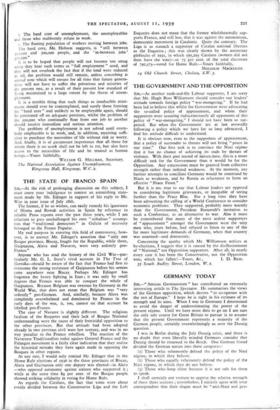THE . STATE OF FRANCO SPAIN SIR,—At the risk of
prolonging discussion on this subject, I must crave your indulgence to contest an astonishing state- ment made by Mr. Edinger in support of his reply to Mr. Wise in your issue of July 28th.
The former, if he so wishes, can easily remedy his ignorance of Hisma and Rowak activities in Spain by reference to reliable Press reports over the past three years, while I am reluctant to pass unchallenged his own " nebulous " assump- tion that "traditional democrats" in Galicia of necessity belonged to the Frente Popular.
My real purpose in entering this field of controversy, how- ever, is to correct Mr. Edinger's assertion that "only one Basque province, Biscay, fought for the Republic, while three, Guipuzcoa, Alava and Navarre, were very ardently pro- Franco."
Anyone who has read the history of the Civil War—par- ticularly Mr. G. L. Steer's vivid account in The Tree of Gernika—should be aware of the fact that Franco had first to overcome the strong resistance of Guipuzcoa before his armies came anywhere near Biscay. Perhaps Mr. Edinger has forgotten the heavy fighting in Iron; it was only by small degrees that Franco was able to conquer the whole of Guipuzcoa. Because Belgium was overrun by Germany in the World War, that does not mean that Belgium was "very ardently" pro-German. And, similarly, because Alava was completely overwhelmed and dominated by Franco in the early days of the war, it, too, cannot on that account be labelled pro-Franco.
The case of Navarre is slightly different. The religious fatalism of the Requetes and their lack of Basque National understanding were the cause of their fratricidal opposition to the other provinces. But that attitude had been adopted already in two previous civil wars last century, and was in no way peculiar to the Franco rebellion. The reaction of the Navarrese Traditionalists today against General Franco and the Falangist movement is a fairly clear indication that they realise the historical mistake they have again made in opposing the Basques in other regions.
At any rate, I would only remind Mr. Edinger that in the Home Rule elections of 1936 in the three provinces of Biscay, Alava and Guinuzcoa only one deputy was elected—in Alava —who opposed autonomy against sixteen who supported it ; while at the same time 84 per cent, of the Basque people showed striking solidarity in voting for Home Rule.
As regards the Catalans, the fact that votes were about evenly divided between the Conservative Liga and the Left Esquerra does not mean that the former wholeheartedly sup- ports Franco, and still less, that it was against the autonomous, democratic movement in Catalonia. Quite the contrary. The Liga is as staunch a supporter of Catalan national liberties as the Esquerra ; this was clearly shown by the autonomy plebiscite of 1931, in which 595,205 Catalans (women did not then have the vote)—or 75 per cent. of the total electorate of 792,575—voted for Home Rule.—Yours faithfully,
MALCOLM MAC.KENZIE.
14 Old Church Street, Chelsea, S.W. 3.








































 Previous page
Previous page